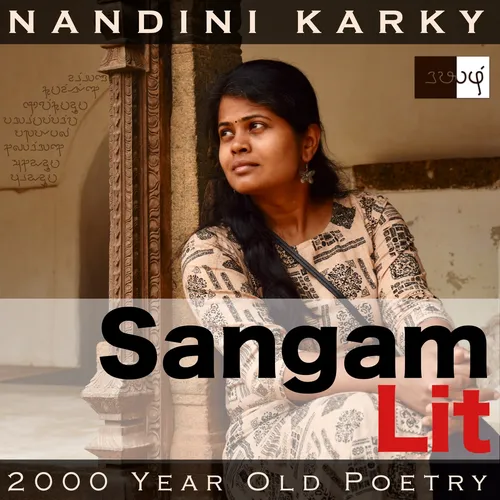Aganaanooru 81 – Questioning the deserting bear
- Author
- Nandini Karky
- Published
- Mon 15 Sep 2025
- Episode Link
- https://nandinikarky.com/2025/09/15/aganaanooru-81-questioning-the-deserting-bear/
In this episode, we listen to a pointed question put forth, as depicted in Sangam Literary work, Aganaanooru 81, penned by Alamperi Saaththaanaar. The verse is situated in the ‘Paalai’ or ‘Drylands landscape’ and vividly illustrates the elements of nature in this domain.

நாள் உலா எழுந்த கோள் வல் உளியம்
ஓங்குசினை இருப்பைத் தீம் பழம் முனையின்,
புல் அளைப் புற்றின் பல் கிளைச் சிதலை
ஒருங்கு முயன்று எடுத்த நனை வாய் நெடுங் கோடு,
இரும்பு ஊது குருகின், இடந்து, இரை தேரும்
மண் பக வறந்த ஆங்கண், கண் பொரக்
கதிர் தெற, கவிழ்ந்த உலறுதலை நோன் சினை
நெறி அயல் மராஅம் ஏறி, புலம்பு கொள
எறி பருந்து உயவும் என்றூழ் நீள் இடை
வெம் முனை அருஞ் சுரம் நீந்தி சிறந்த
செம்மல் உள்ளம் துரத்தலின், கறுத்தோர்
ஒளிறு வேல் அழுவம் களிறு படக் கடக்கும்
மா வண் கடலன் விளங்கில் அன்ன எம்
மை எழில் உண்கண் கலுழ
ஐய! சேறிரோ, அகன்று செய் பொருட்கே?
In this trip to the drylands, the region appears in a hypothetical question put forth by the confidante to the man, as detailed in these words:
“Rising up and setting out on its daily stroll, a bear, adept at claiming its food, feeds on the sweet fruits of the Mahua tree with soaring branches, and when it starts disliking this food, the bear moves towards a termite mound with many small hollows, built by the effort of many families of white ants, working together. Nearing the wet-mouthed, tall mound, akin to an ironsmith blowing through the nozzle of the bellows, the bear breathes within, and gathers its food. In those barren places, where the earth is split into cracks, and where the sun scorches the eyes, climbing upon the upturned, dried-up branch of the burflower tree, growing near the path, a lonely eagle sits with suffering. Such is the heat-soaked, long paths of the fiery and formidable drylands. The lady’s dark and beautiful kohl-streaked eyes are akin to the town of ‘Vilangil’ ruled by the great and strong Kadalan, who overcomes shining spears of his enemies with his army of elephants in the battlefield. To traverse those drylands, pushed by your esteemed heart, O lord, are you going to leave to earn that wealth to be made faraway, making those exquisite eyes of hers shed tears?”
Let’s attempt a walk through the sun-swept paths of the drylands and learn more! The confidante starts by describing the drylands region, and to do that, she follows the activities of a sloth bear, that has risen from its rest, and is setting out on its daily activities. The first stop of the bear happens to be a Mahua tree, with dried-up leaves, and the bear manages to collect some fruits on a tall branch. After having its fill and wanting no more of the fruit, the bear navigates to its next food place, which is a termite mound, built by the concerted effort of many groups of ants, the confidante details. Here, akin to a blacksmith blowing into the bellows, the bear too breathes into the termite mound to clear the ants and feed on its tasty snack of termite comb. In a such a place there’s nothing but heat, the confidante continues, now turning her focus to a lonely eagle, perched on top of a bur flower tree. Saying how the earth is all cracked up and the burning heat scorches the eyes, the confidante sums up this place as one dry and dreary place to be! Then, she goes on to describe how the lady’s eyes are like the famous town of ‘Vilangil’ ruled by a victorious King Kadalan, known for his army of elephants. The confidante concludes by asking the man, whether he was going to make those beautiful eyes of the lady shed tears, by leaving her and parting away to those drylands, so as to earn wealth.
A question with which she expects to move the man and make him put off his plans of parting away. The interesting elements of this verse are the metaphors seamlessly placed in the narrative. For instance, in the scene of the bear tiring of the Mahua tree fruits and moving towards the termite mound, the confidante places a metaphor for the man, relishing the lady’s company, and then as if done with that, moving towards seeking wealth. In the image of the lonely eagle, sitting in suffering in the middle of the drylands, the confidante predicts that’s going to be the precise future of the man, if he so decides to leave the lady. Thus, a verse comprising of a simple question, ‘Are you really going to part away and make her cry?’, is elevated by its elegant description of the dynamics of emotions through the actions of elements in nature!
